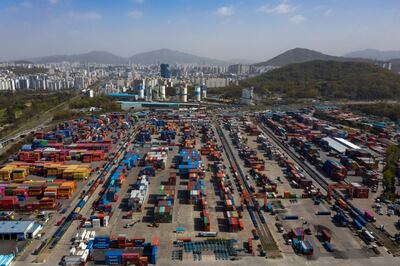Ever since the World Health Organisation declared the Covid-19 outbreak a pandemic last month, a state of uncertainty has prevailed across the globe, triggering a massive impact on economies and drastic changes to consumption habits, and in turn, affecting the supply-demand balance.
One of the most profound changes in the GCC region is the sharp decline in oil prices. In addition, the travel bans imposed by US President Donald Trump on European countries coupled with the decline of global stock markets contributed to a paradigm shift in the world as we knew it.
With the global advances in medicine and the increasing sense of responsibility towards the spreading pandemic, I trust that countries around the world will navigate their way in these difficult times and be able to decrease the speed at which the virus is being transmitted. However, the same cannot be said for the world economy that appears set to suffer longer. In its aftermath, the pandemic will teach us some crucial lessons about diversifying and safeguarding the future in the best way we can.

Crises, such as the one we are currently facing, are largely inevitable. World economies have previously witnessed many crises that are financial, political or administrative in nature. The solution to every crisis, regardless of its cause, lies in preparedness. While the agility of the economic system is crucial, our resilience in coping with the evolving landscape cannot be underestimated either. We will not be able to survive without being able to adapt. This is true for even the smallest projects in any economic system.
In the present circumstances, there is no time for any form of bureaucracy. All economic models are subject to some modifications. It has become inevitable for central banks to invoke their powers in times of crises, such as lowering interest rates and injecting liquidity into the markets. However, we have to brainstorm for new precautionary measures that address the looming aftermath of the pandemic – measures that are tailored to combat each obstacle we may expect to face.
The GCC countries have adopted various measures, such as generous economic stimulus packages, government fee exemptions, and reducing expenditure. These are promising solutions but being prepared, agile and resilient in taking decisions is the bigger challenge.
Once consumption habits change due to more people practising social distancing as advised, there are several commercial opportunities that can be leveraged. To avoid being subject to monopolies, price hikes, non-availability of commodities, or panic selling like in other countries, we need to find innovative measures that are easy to implement. Today, there are challenges and opportunities that need quick adaptation on legislative and executive levels.
Putting in place precautionary measures to prepare for any potential crisis and making the economy ready for all changes is crucial. In this context, the Bahraini experience is worth mentioning. Bahrain was one of the first countries to commercially operate 5G networks to enable the digital economy and the IT sector. This has given its economy a competitive first-mover advantage, making it easier for consumers to connect in a world that sees a rising demand to work and conduct meetings from home.
The most important lesson we have on hand is the one learned from the global financial crisis of 2008 – the importance of economic diversity and sustainability. The idea for the GCC countries to step up economic diversity and not rely on oil came as a result of this crisis, and the current pandemic has proved yet again how important it is to be part of a diverse economy. The Covid-19 crisis demonstrates the critical nature of the sustainability efforts that will help enhance the agility of the economic system to overcome changes. It also reiterates the importance of being self-sufficient in terms of basic commodities.
Since we live in a hyper-connected world where demand and supply are affected by international markets and movements, the wider global economic system needs to build its resilience to handling sudden changes in consumption patterns. This ultimately calls for collective responsibility in enhancing and reforming the international trade system.
Our current state of recession does not come as a surprise. The global financial markets are unable to tolerate shocks like the Covid-19 crisis, given their reliance on central banks and the absence of attention paid to reforming credit markets or providing fair and sustainable conditions for investment and trade.

The adoption of more investment risks globally after the beginning of the pandemic, once investors gained confidence in the willingness of central banks and their ability to provide liquidity at times of crises, shows the market appetite to adopt quick-fix solutions. However, the fact remains that the efforts of central banks were not sufficient to contain the crisis, leading to more losses.
The current actions of central banks will definitely ensure a positive impact, but convincing investors to avoid taking non-sustainable decisions is never easy. In addition, there is no clear plan or exit strategy in place that defines the role of all stakeholders in dealing with prices, debts and liquidity. Global fiscal deficit is inevitable, and it requires tough political decisions and a roadmap to save markets and businesses.
Economic reforms in the post-pandemic era necessitate a starting point to prepare for other potential crises. The powers of the central banks alone are not enough to revive markets with limited activity. To be truly impactful, governments in the region must fall back on sustainable and agile commercial, financial, investment and legislative practices that are resilient to sudden and inevitable changes.
Mohammed Alardhi is executive chairman of Investcorp, chairman of Bank Sohar and was longest-serving native head of the Royal Air Force of Oman














